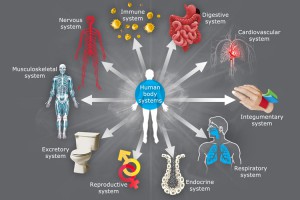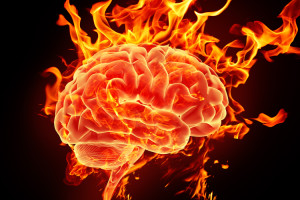By Deepak Chopra, MD, FACP and Rudolph E. Tanzi, PhD
 There are two reasons why radical well being hasn’t captured the imagination of the general public. As we saw in the first part, people all too often let their health go and then depend on the standard medical approach of drugs and surgery. Taking an active role in their own well being doesn’t seem crucial compared to the powerful interventions of modern medicine once symptoms of illness appear. The second reason, however, carries just as much weight. People aren’t aware of the new findings that indicate how central the mind-body connection actually is.
There are two reasons why radical well being hasn’t captured the imagination of the general public. As we saw in the first part, people all too often let their health go and then depend on the standard medical approach of drugs and surgery. Taking an active role in their own well being doesn’t seem crucial compared to the powerful interventions of modern medicine once symptoms of illness appear. The second reason, however, carries just as much weight. People aren’t aware of the new findings that indicate how central the mind-body connection actually is.
We’re all accustomed to seeing our bodies as a set of separate parts (cells, tissues, organs) operating like a machine, and since machines tend to break down one part at a time, medicine has been compartmentalized into specializations for the heart, liver, brain, and so on. If your car doesn’t start, a mechanic examines the alternator or the battery; if your heart stops ejecting enough blood, a cardiologist checks it out with diagnostic tests.
Radical well being jettisons the model of body as machine for something closer to reality: a model that is living, dynamic, fluid, and adaptive. This new model leads to a state of higher health controlled and monitored by each person. The reason that directing your own health is so powerful can be summarized in a few insights that have taken decades to develop. As we emphasized in our book “Super Brain”:
- Every thought, feeling, and sensation in the mind sends a message to every cell in the body.
- Cells operate through feedback loops that mesh with the feedback loops of tissues, organs, and the body itself.
- Disease begins with subtle imbalances in these feedback loops.
- The brain’s ability to consciously direct a person’s life depends on intelligence embedded in every cell.
- Behavior today has consequences for our genes, altering their expression in profound ways.
Mainstream medicine finds itself in a paradoxical position at the moment, because these new insights, which came about from cutting-edge research, have had minimal effect on medical school training and the practice of physicians. The “body as machine” model, complete with outmoded notions of fixed genes, “hard” inheritance, and duty to treat patients only after symptoms appear remains firmly rooted in doctors’ minds.

Photo Credit:University of Waikato
Which leads to the conclusion that each person must decide to take advantage of the new model. The things that health-conscious people already do aren’t negated. It remains of primary importance not to smoke, avoid excess weight, and minimize use alcohol (with perhaps an exemption for drinking a glass of wine a day, at most). If you already have taken these steps, the new model also supports other familiar advice: exercise moderately, eat a good, balanced diet, and avoid environmental toxins. But these steps bring us only to the very edge of radical well being.
The really fascinating area to explore is known as “self-directed biological transformation,” which has enormous implications for your present health and everyone’s future evolution. Change is inevitable, and transformation is taking place in your body many thousands of times a second. For the most part, each of us has played a passive role in our own transformation, allowing biological processes, governed by our genes, to run automatically. The problem is that, as miraculous as the body’s feedback loops are, they deteriorate over time and are susceptible to imbalances that aren’t self-correcting. The result is unhealthy aging and disease. Short of that, the level of well being you experience is vulnerable to degradation biologically, much of which can be avoided.
Intervening in the body’s feedback loops comes down to a simple principle: The more positive the input your body receives, the more positive its output. Your body, down to the genetic level, is altered by the events of everyday life. (It’s already known that positive lifestyle changes directed at preventing and healing heart disease alter as many as 500 genes.) The time is right for proving just how much overall control we have over this enormous potential in the mind-body connection. One can foresee the future as self-directed biological transformation.
The platform for self-directed transformation is available to everyone. It includes yoga and meditation, exercise for strength, agility, endurance and play, a balanced farm-to-table and Mediterranean diet, good sleep, and stress reduction. These are well-established ways to improve bodily function. But there’s more to explore, given another basic principle: Every experience in consciousness has a physical correlate. A mystic experiencing deep inner silence, a Buddhist monk meditating on compassion, or a saint having a vision of angels isn’t exempted from this principle, because the label of “spiritual” doesn’t diminish the mind-body connection – that connection is actually amplified.
Whatever activity you undertake is a step in self-directed biological transformation. Knowing this, how should you choose to live? Certainly a higher priority should be given to those things that make you more conscious, with the aim of being more centered, free of psychological deficits, capable of experiencing love, bonding with others, and pursuing happiness with the dedication we show in pursuing success.
These intangibles assume central importance in achieving radical well being, for the simple reason that the true controller of well being, which is consciousness, is intangible. By opening up the doorway between consciousness and your gene activity, well being takes a leap forward. For example, recent studies indicate that meditation can have a strong effect on the length of chromosome telomeres, the nucleotide sequences that protect chromosomes from the deterioration linked to aging. That these beneficial effects occur so quickly indicates just how responsive genetic activity is to mind-body interventions – something never previously suspected.
[youtube]http://www.youtube.com/watch?v=6Ci59fWmc7g&feature=share&list=PLdrUeeBIMbrIRQZM8yUbWpZfRwP82AKYr&index=12[/youtube]
Courtesy of YouTube/The ChopraWell
To validate the effects of consciousness on biology requires imaginative, forward-looking research. At the Chopra Center alliances have been made with top-level medical-school researchers to delve into exactly how self-directed biological transformation works. Groups of subjects are being recruited to undergo intensive experiences of enhanced well being, with the aim of using the latest digital monitoring to detect change at heart and brain activity at the cellular and level of gene expression through blood samples.
Studies planned include:
- Whole genome sequencing using HiSeq at Illumina
- Whole genome gene expression of roughly 40,000 gene transcripts
- Alzheimer’s-related amyloid beta protein species in plasma by ELISA and MesoScale
- Cytokine levels in plasma by MesoScale
- Whole-genome epigenetic changes using Pacific Bio systems
- The plasma proteome
- Blood based markers of cellular aging including:
- Telomerase and telomere length
- Oxidative stress
- Inflammation, cardiovascular disease and stress biomarkers
- Mitochondrial DNA health
- Single lead ECG/ heart rate
- Heart rate variability
- Physical activity
- Sleep quality
- Respiratory rate and depth
- Photoplethysmogram
The current thinking holds that genes are fixed, but new research shows gene activity can be changed by experience. The results have been entirely encouraging so far, and there are other related studies that are exploring consciousness-related changes in such areas as risk for Alzheimer’s disease. The public has become deeply confused – as have practicing physicians – by recent findings questioning many standbys of mainstream medical interventions, from antidepressants to statins, from mammograms to PSA testing for prostate cancer, up to and including the benefits of cardiac bypass surgery and angioplasty in reducing mortality rates from heart attacks. Sometimes, these interventions are unavoidable. But, the positive thing to do is to embrace a new model of human biology that will keep people in the best possible condition of well being. A person who is thriving in mind and body holds the key to most medical mysteries before they are solved.
Deepak Chopra, MD is the author of more than 75 books with twenty-two New York Times bestsellers including Super Brain. Join the weightlessproject.org to eradicate obesity and malnutrition. For more interesting articles visit The Universe Within
Rudolph E. Tanzi, PhD, Joseph P. and Rose F. Kennedy Professor of Neurology at Harvard Medical School Vice-Chair of Neurology and Director of Genetics and Aging Research at Massachusetts General Hospital.





